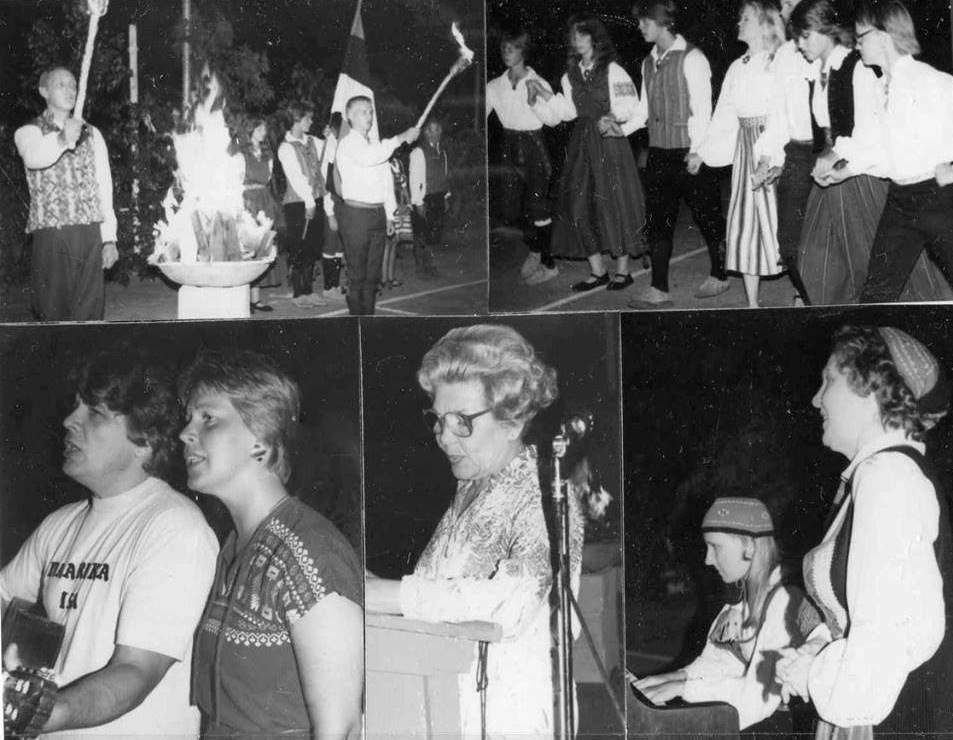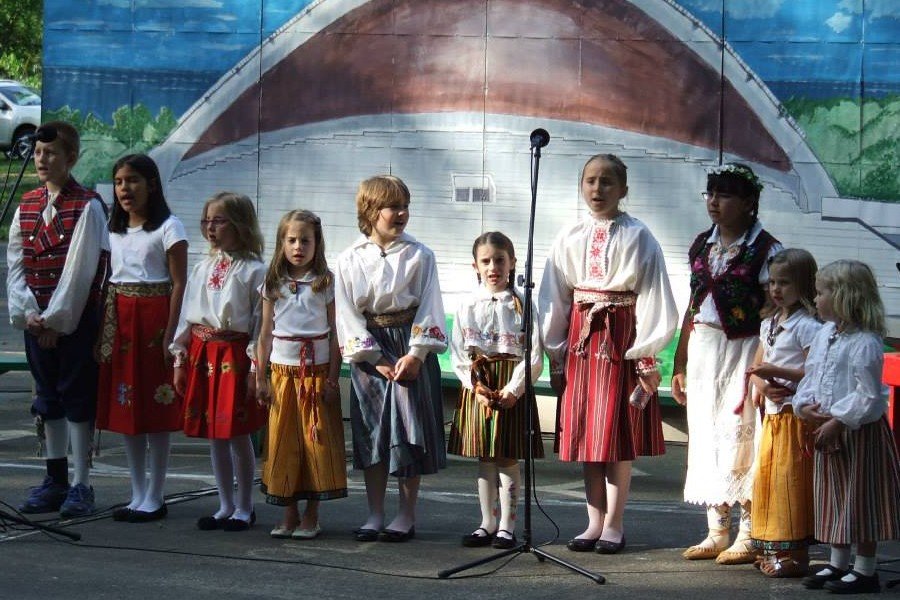Andres Simonson writes about the Beebi Boomers – the children born in the United States, Canada, Australia, Sweden and other countries to native Estonian political refugees who fled the Soviet invasion and the illegal occupation of their fatherland.*
In the war-torn Estonia of 1944, two families from disparate parts of the country make a most difficult decision. With a future of despair advancing rapidly from the east on tank treads and the wings of well-armed bombers, unbeknownst to the other, both families decide to flee for the prospects of the unknown. They make a trade. Life, or quite possibly death, under the invading Soviets for a chance at nomadic normalcy under the premise of returning at some future date. The die has been cast. The families, meagre belongings in tow, are now political refugees on the run.
Separately, but with a shared destiny in front of them, the two families find security and shelter in American and British-controlled displaced persons’ camps in Germany as the Second World War winds down. Separately, but with an intertwined future to be, they later make the long journey across the Atlantic Ocean for the shores of the United States. Separately, but with a connected fate emerging, they find housing in the New York and Philadelphia metropolitan areas and transform the structures into homes. Separately, but soon to meet even if they don’t know it yet, the two families assimilate while holding their ancestries close to their hearts.
Later still, in 1960, the young children fleeing with their divergent families two decades ago are now adults – a young man and a young woman. In an Estonian enclave in Lakewood, New Jersey, at last, they meet. Shyly at first, they chat. Stories are exchanged about the journey they hold in common and the memories of their places of birth. Comfortable with each other, and with butterflies in their bellies, they go on a first date. A subsequent phone call leads to another. Soon, they fall in love. They marry. They procreate. A new family is born…
Ironically fortunate souls
Imagine owing your very existence to one of the 20th centrury’s greatest atrocities. Well, as briefly summarised above, that’s me. Not just me though – there are countless other ironically fortunate souls that fill out this story. We are the Beebi Boomers – the children born to native Estonian political refugees that fled the Soviet invasion and the illegal occupation of their fatherland.
Most reading this are familiar with the Baby Boomers. They are the post-World War II population cohort that sprang from the returning infantrymen and service people. In the United States, Canada, and parts of Europe, the Baby Boomers are the generation born from roughly 1946 through 1964. They compose a large population segment of their respective countries. But substitute the English spelling of the word “baby” for the Estonian translation “beebi”, add a decade or so to the birth years, and you’ll have a unique subset and extension of the Baby Boomer populace – Beebi Boomers.
These Beebi Boomers are natural born citizens of the United States, Canada, Sweden, Australia, and dozens of other countries around the globe. Their birth certificates are as varied as are their lots in life. And yet, they share a commonality of being. For you see, if the Soviets had never invaded, their parents would have never fled Estonia as small children. If they had never fled, maybe their father had stayed in Elva and their mother in Tallinn – as probably would have been the case with my parents. If those families had never left, the Beebi Boomer’s parents would have never caught each other’s eye at a location thousands of miles from a land where they most likely would never have met.
I am a Beebi Boomer. My brother is a Beebi Boomer. My friends from Suvekodu Laager (a summer camp) in Long Island, New York, are Beebi Boomers. I have extended family in the form of Beebi Boomers in Canada. I see Beebi Boomers often at the Estonian-American clubhouses in Lakewood, New Jersey, and in New York City. I keep in touch with them on social media. I read about Beebi Boomers in publications such as the one you are reading right now.
An Estonian-Australian teacher in Melbourne, she is a Beebi Boomer. An Estonian-Swede, a musician born to parents from Pärnu and Tartu, he is a Beebi Boomer. A natural born German tech consultant, who spoke Estonian at home and now uses those same language skills to do business in Tallinn, he is a Beebi Boomer.
Hyphenated Estonians
In a strange twist of fate, we owe our very existence to the same forces that decimated many of our extended families. When I look back on the Soviet war crimes, it’s a tough pill to swallow. I am here. But many were slaughtered to set my existence in motion. Still, none of us can shape our ancestries. We are all functions of an infinite amount of historical twists and turns. Call it what you will – chance, destiny, or a divine plan – the individual has no control.
So, we owe it to our ancestors to tell our stories. We owe it to our forefathers and foremothers to keep the Estonian traditions and language alive. We owe it to those that perished to lead fruitful lives, but to never forget the means to our end.
But maybe most importantly, we owe it to ourselves to contemplate our path to existence while enjoying our lots in life as hyphenated Estonians.
We are the Beebi Boomers.
I
Cover photo: Young Estonian expats in the United States in the late 1950s (courtesy of Kalev Ehin). * This article was originally published on 4 July 2013 and lightly edited on 11 January 2018.





I am one too… and proud of it. (Estonian/Swedish, now living in Canada) Tracing back has been most interesting. Love Estonia!
My mother is from Tartu, my father from Saaremaa. They never would have met except in the US. As far back as we know I’m a pure-bred Esto. Of course I married a nice American boy of German and Danish decent.. Somehow I just didn’t meet the love of my life at Suvelaager – either Middle Island or Lakewood. We’re in Basking Ridge NJ.
What percent of beebi boomers do you think stayed in the fold and what percent left for good? It would be very interesting to hear a range of exeriences of this unique historical generation. Recalling many peers of your age who are no longer to be seen, experiences not quite as sunny as yours probably occurred. But glad the way it worked out for you.
They never would have met? Really?
Of course in Estonia when you are born in Elva or Saaremaa you never ever leave your birth place to study or work.
Anyone know of how many are left of the Estonian Lutheran Church that met in the church at Lexington Ave, NYC? The Kiil family, as well as others?
My parents, Laas and Ludmilla Paju, settled in Putnam, Connecticut, and visited that NYC Church Faith Community as often as they could. My one regret is that I wish I had maintained my language skills, although it was my first language .
I have lots of good memories, and my Estonian roots run Blue Black and White!
Very much enjoy posts and info about everything Estonian. Look forward to seeing more in the future.
What’s that make we Grandchildren of those who fled who still have Estonian citizenship along with that of the country we were born in? Gen. 2 boomers? haha
Same, dual citizen. But I value my Estonian passport more.
My husband Sean is a first generation American, his family was from Tallinn. The men in his family killed by the soviets. His grandmother, father and aunt escaped thru Germany and eventually made it to NYC after the WW2. Much of his family history is lost but just recently extended family that made it to America has been in touch and we hope to meet them soon. We are looking forward to visiting Estonia in the next few years. Our three sons are proud to be part Estonian and we all get so excited when we meet someone from there and share how our family survived. We too live in NJ.
I too am anxious to learn more about the “details” and the story that I wish now I had heard more about. I left Estonia with my mother when I was only six months old and we lived in the displaced persons camps of Germany. We came through New Orleans and settled outside Chicago where my parents were active in the church and I became more “American” that the heritage I now want desperately to know about. I’ll continue to do more research on my own as both my parents are deceased.